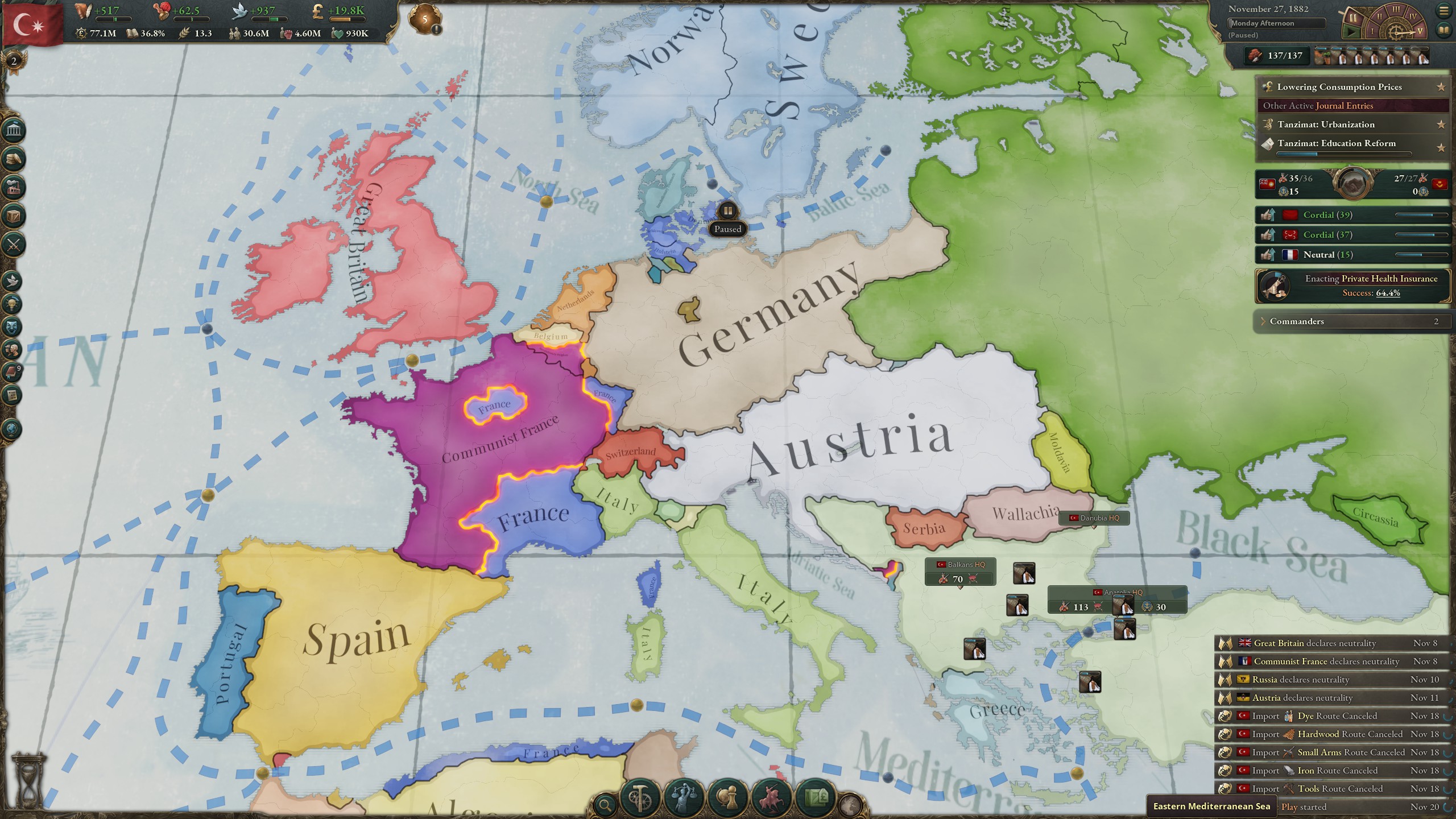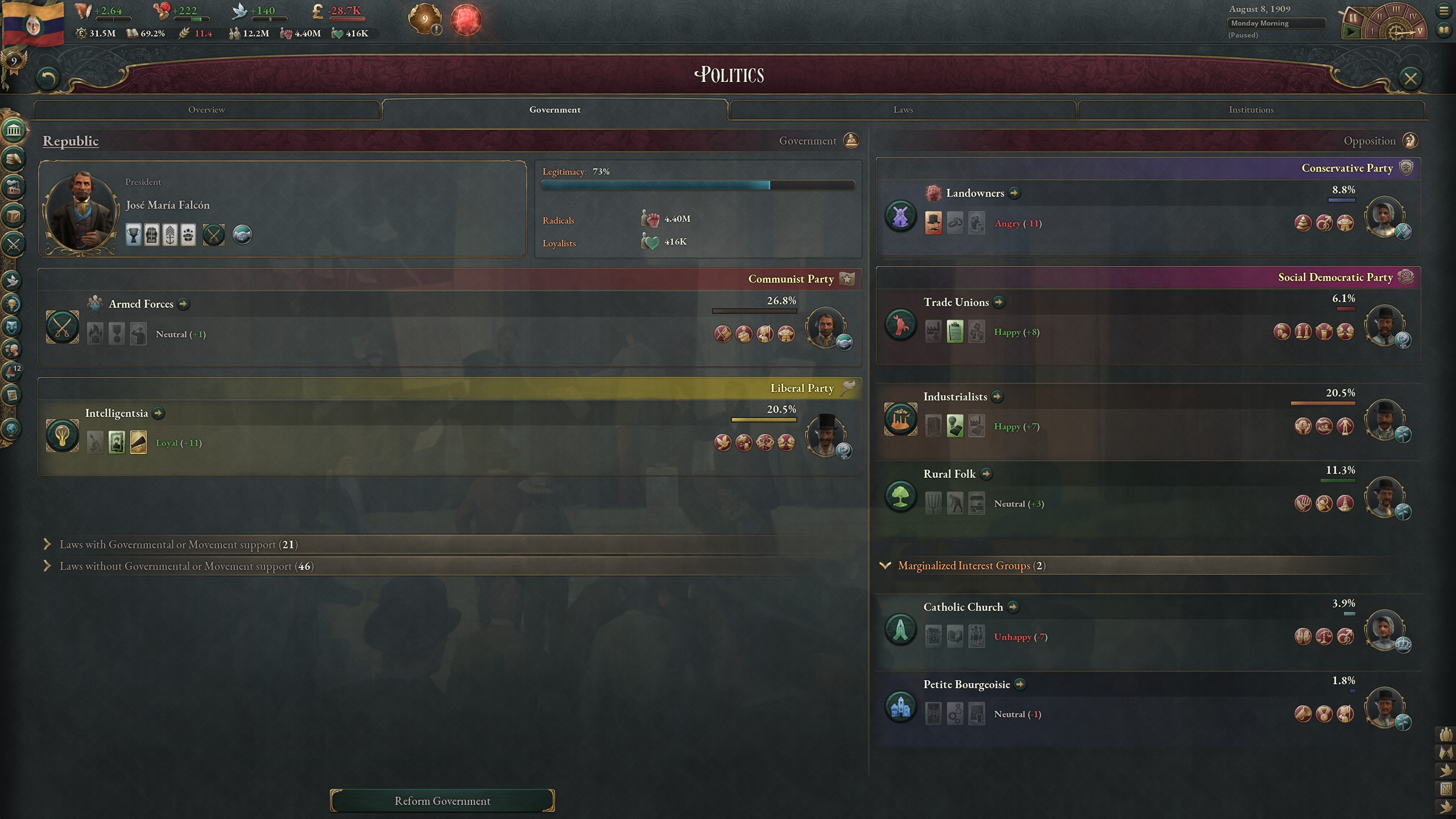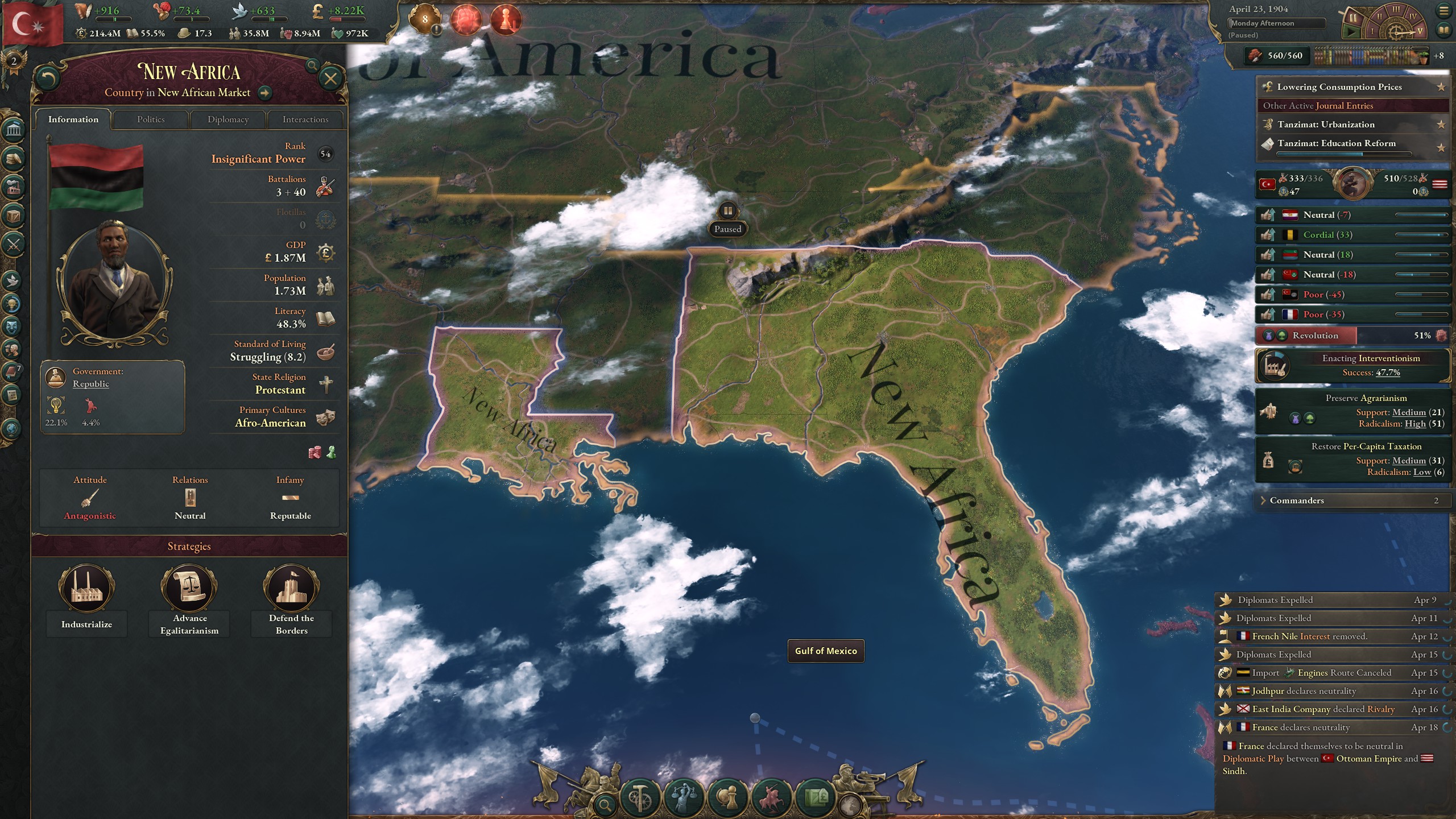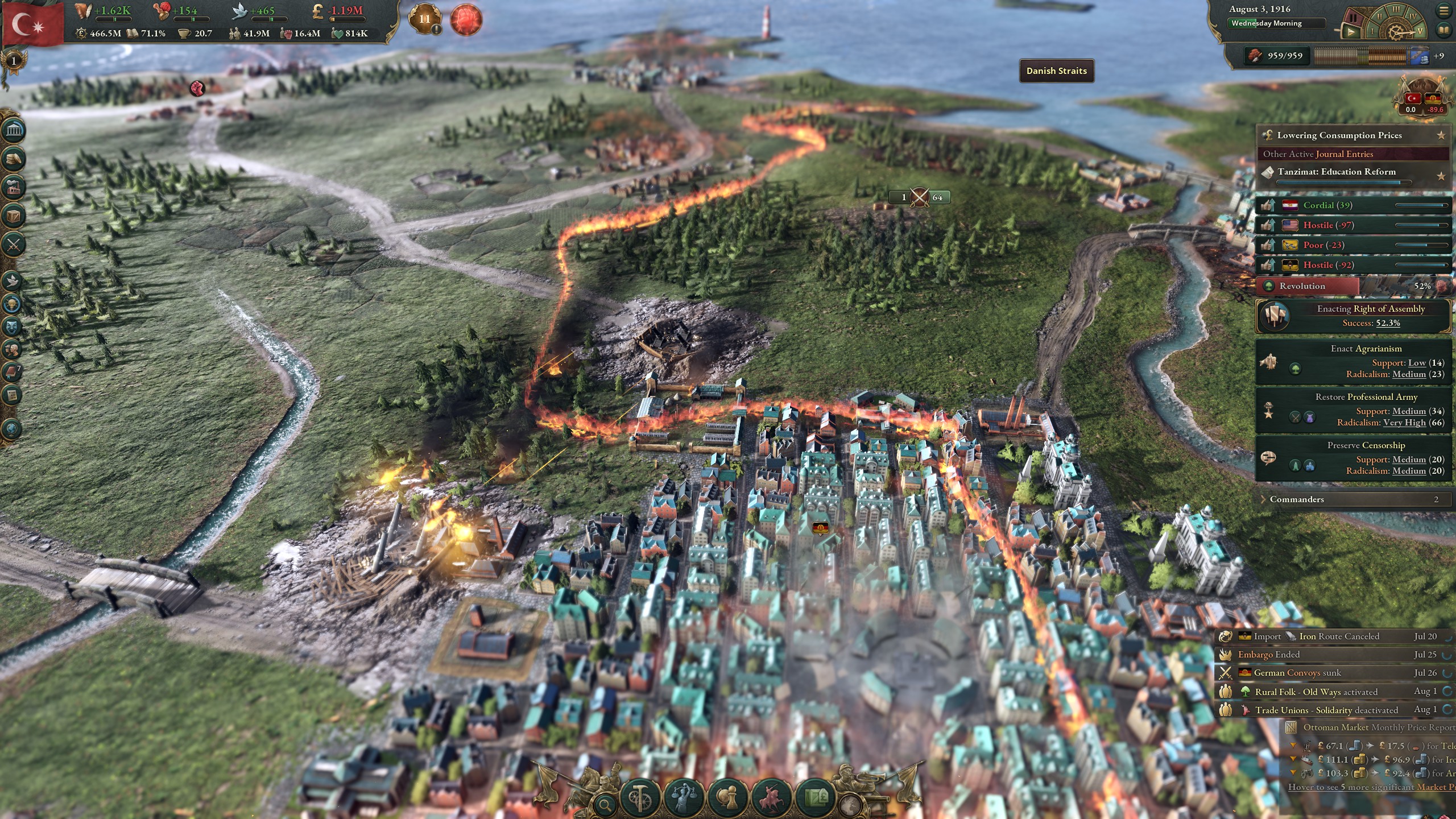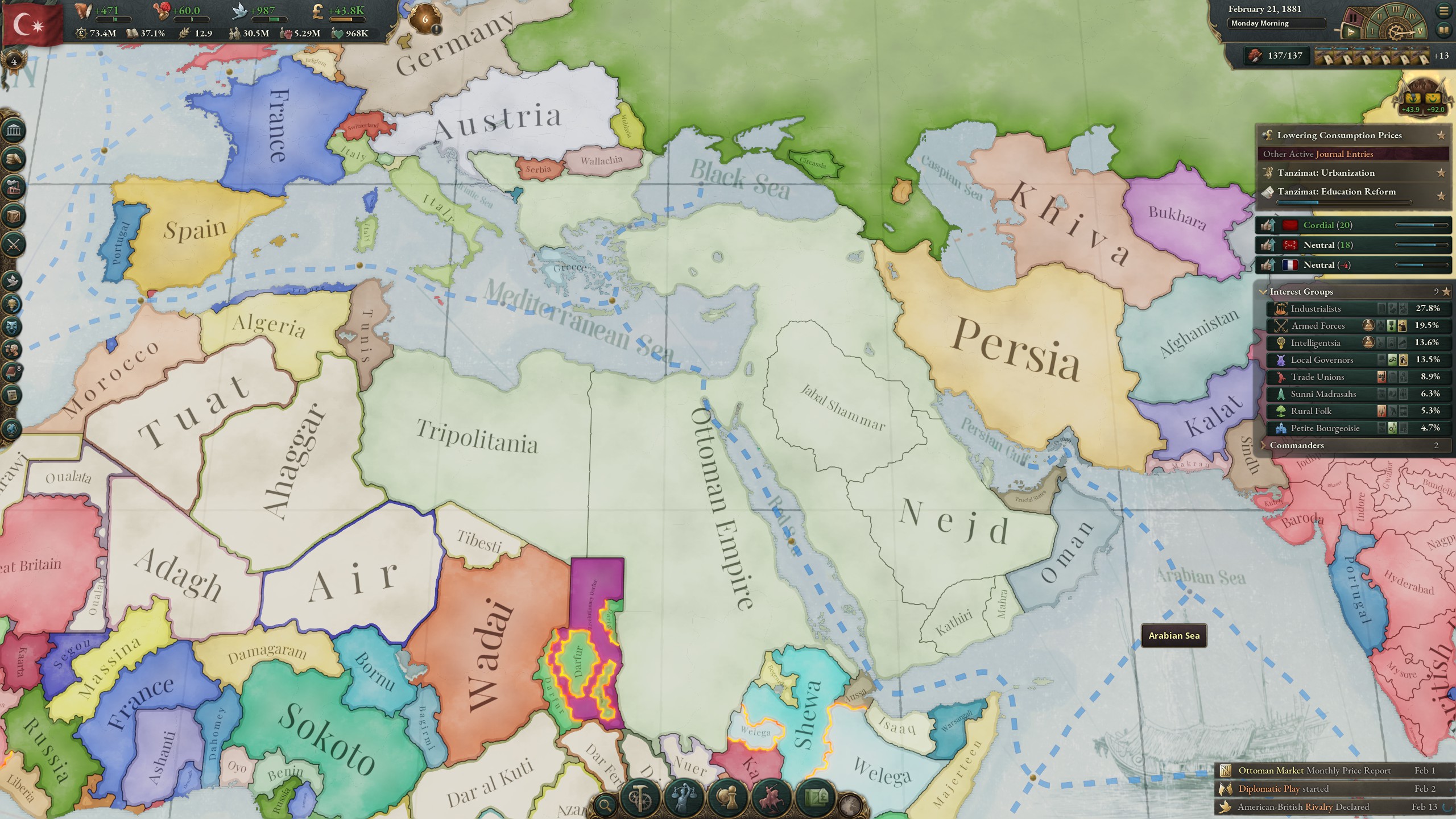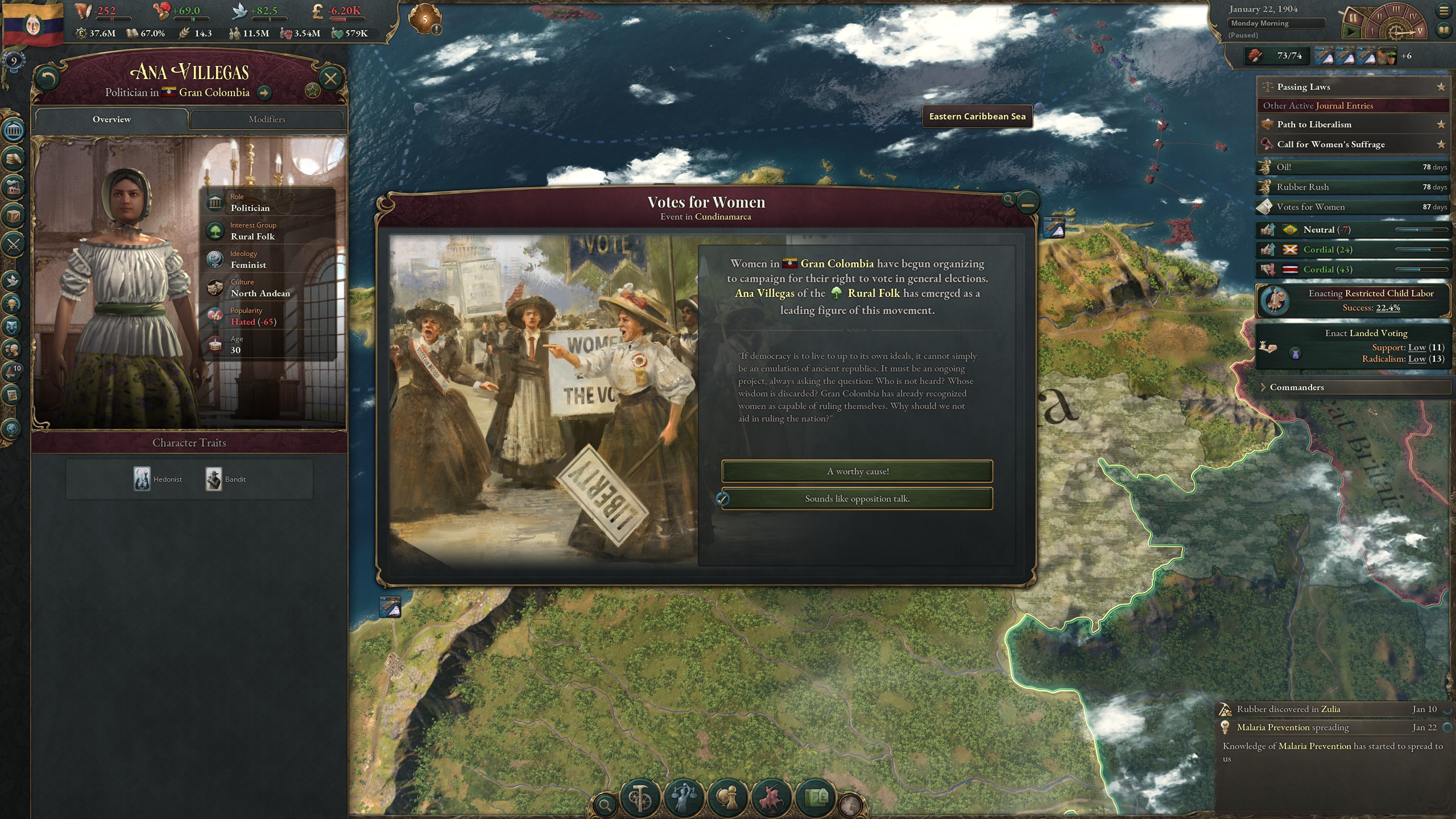Our Verdict
Victoria 3's attractive historical sandbox is filled with potential, but it's on you to unlock it.
PC Gamer's got your back
What is it? Industrial-scale Grand Strategy
Expect to pay: £42/$50
Release date: October 25, 2022
Developer: Paradox Development Studio
Publisher: Paradox Interactive
Reviewed on Radeon RX 6800 XT, Ryzen 9 5900, 32GB RAM
Multiplayer? Yes
Link: Official site
It's 1836 and the industrial revolution's machines are in high gear. The coming century will change the face of the human world with a population explosion, a second industrial revolution, and more. In Victoria 3 you take control of a society attempting to ride this wave of explosive change to its end in 1936. What you do along the way, and how much fun you have with it, is up to you.
Victoria 3 tasks you with building a nation by shaping its laws, economy, people, and institutions. The developers at Paradox call it a "society-builder". It wants you to care about the minutiae of political movements, distribution of power, population trends, economic organization, factory output, or global trade, and then to start manipulating them.
That might be hard for some. Victoria 3 boasts some of the most intricate game mechanics I've ever seen in a strategy game. They can be overwhelming. You can micromanage trade routes, chart paths for societal reform, tweak your nation's build queue, or examine production methods. Even a small nation is constantly given options to fiddle with, and progress in large nations can slow to a crawl as you scramble between trade crises and multi-front wars.
Managing this is made easier by one of Paradox's better user interfaces. It's not quite as friendly as Crusader Kings 3, but it does have significantly more complex systems to work through. The bottom bar in particular is useful, with shortcuts to all kinds of national actions, from building and diplomacy to mustering troops. The map, meanwhile, is striking and impressively detailed, with little trains chugging along, mines scarring the terrain, and tiny soldiers trading gunfire.
I am the law
It's in Victoria 3's simulation of how a society is governed where the game is at its best, drawing you deeper and deeper in. Governments are based on laws: sets of options which cover diverse topics such as how your economy is structured and who gets to vote. Changing laws requires the support of interest groups, Victoria 3's finest mechanic. These groups like landholders, petite bourgeoisie, armed forces, trade unions, industrialists, religious authorities, and rural folk gather up clout from their members and try to push their agendas, forming dynamic political parties.
These groups intersect masterfully with every other game system, creating opportunities and obstacles. Maybe you want to change tax laws to fix your budget, but the powerful industrialists will cause a big stink, or maybe even team up with another group and threaten revolution. So you change voting laws to give the poor power, reducing the industralist's political clout. Of course, this means you now have another group able to push forward their agenda.
It's in Victoria 3's simulation of how a society is governed where the game is at its best, drawing you deeper and deeper in.
Interest groups also have leaders, and while it's disappointing that you can't interact with them directly they do have nice portraits—and pleasingly disruptive effects. Playing as Gran Colombia I had a communist become leader of my powerful armed forces. The normally conservative military bloc shifted to form a new Socialist Party with the trade unions and began advocating social reforms. Reforms that would really tick off the powerful Conservative Party run by the Catholic Church and landowners.
Keep up to date with the most important stories and the best deals, as picked by the PC Gamer team.
Surprisingly, internal politics seem to barely affect international relations. Your World Socialist Vanguard State could be best buddies with Her Majesty's Oppressive Empire with little to no pushback internally or externally. While this might seem like cutthroat realpolitik, in action it just feels like a lackluster system.
The core of all those interest groups are people, also known as pops. Every person on the planet is simulated in the background. They have jobs and families, and they want various necessities and luxuries. They migrate and move in a system which is supremely fascinating to watch in action. When ideologies like socialism and fascism are invented pop groups gain new supporters or goals, triggering unrest and revolution both at home and abroad.
Your big concern with pops is their standard of living, cultural discrimination, and employment, but trying to improve these things involves solving big social and political puzzles. Freedom of religion and giving immigrants citizenship will piss off other people even while it improves lives, so it's a thorny but compelling balancing act.
Of course, as with many other systems in Victoria 3, it can spit out some weird results. A vast wave of Lacustrine Bantu people are migrating to Oregon, a popup says. How, I ask, are thousands of people from halfway around the world, originating in undeveloped landlocked nations, migrating so surely and rapidly? Whatever, I guess they need jobs now.
Big business
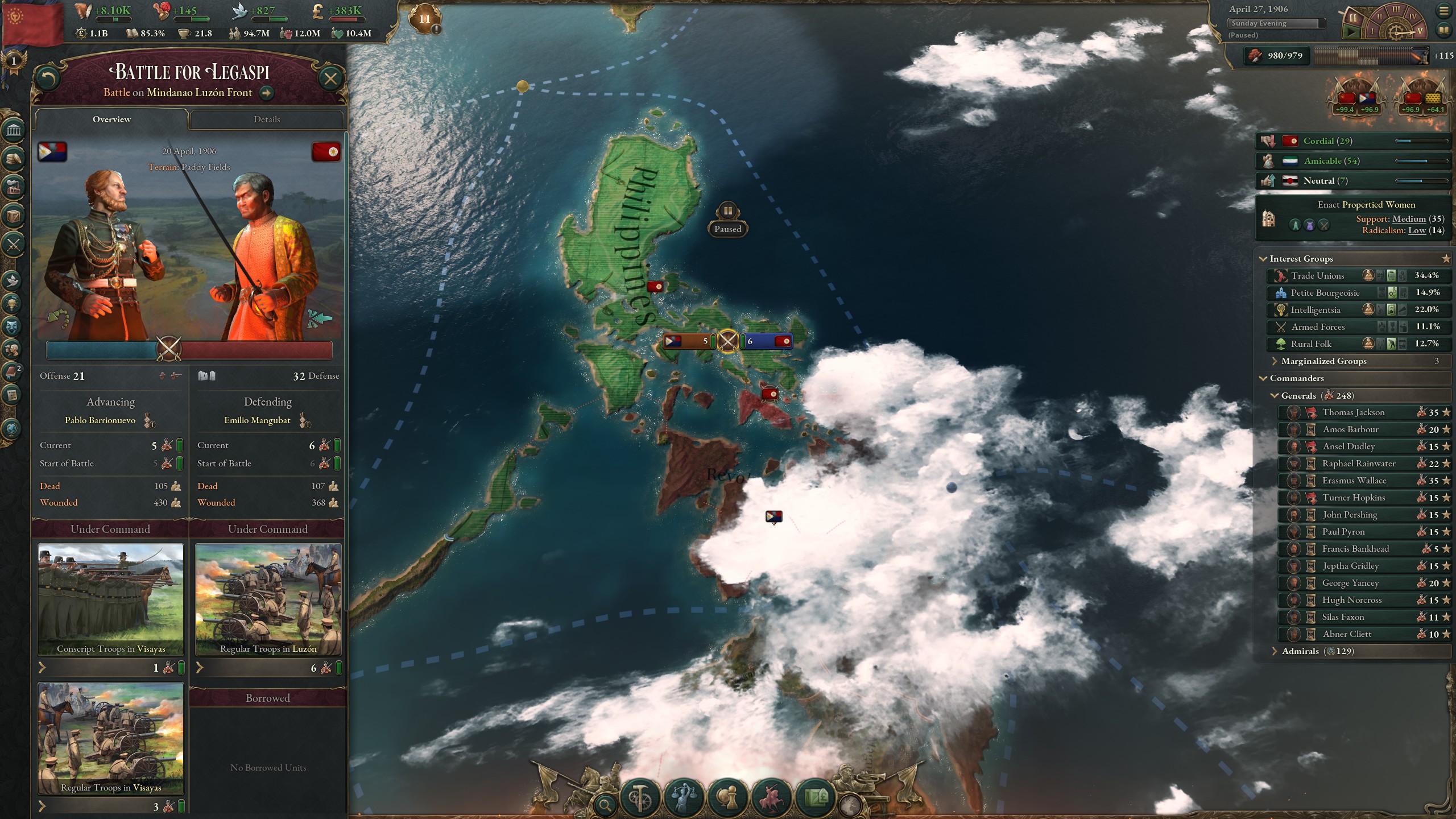
Alongside managing a nation's people, your hand is also on the tiller of trade and industry. Victoria 3 has you serve as a kind of omniscient chief executive, deciding what new factories, mines, infrastructure, and farms get built. You'll need cash for that, of course, but whether it's from wealthy investors or the state itself, these are your decisions—the buck always stops with you.
The buck always stops with you.
Victoria 3's economic system is a slick simulation that incentivizes real world behaviors. You don't always want to hoard wealth. You can run a deficit for a few years, then build up a reserve, or nearly bankrupt yourself fighting world wars before entering years of austere recovery. And if you're missing some important goods, you can look abroad and start exploiting less developed nations.
Planning your economy, finding out what goods are needed to industrialize, what raw inputs to source and from where, is the stuff that economic strategy dreams are made of. The added complexity of deciding production methods and ownership stakes is just icing on the customizable cake of your nation's market.
As opposed to fiddly tracking of every single bushel of wheat, Victoria 3 provides comprehensibility by saying that while supply of materials is unrealistically infinite it'll eventually hit a very, very expensive price ceiling or become so cheap it market crashes into the floor. Helpfully, a rich trade system lets you quickly address deficits or excess from the same screen, and good feedback notifies you when trade routes post a negative balance.
The intermingling of business and state quickly becomes a colonialist machine that eats people and spits out bones. You'll fight wars of conquest over rubber just so your people can have bicycle tires—or find your budding socialist utopia playing world police to stop others from doing the same.
Aggressive negotiations
Eventually, of course, you'll have to deal with conflicts both domestic and international. These conflicts aren't always armed ones, however, and many take place across the negotiating table. This is perhaps the weakest part of Victoria 3, and only a few key systems keep it from being a total dud.
Militaries are managed abstractly, with your armies run by generals assigned to fronts. You can tell them to either hold the line or try to advance and capture territory. It's actually a pretty fitting simulation of 19th century warfare—at least from a politician's chair—because it's about hoping the army you've built, the equipment you've produced, and the person you've picked to lead it can bring you victory.
When it comes to international relations the AI is static at best, unpredictable at worst.
Your suite of diplomatic options are simple. In order to do most things you make a diplomatic play: Claim a state controlled by another country as yours, demand another nation submit as a puppet regime, force others to adopt specific laws. You make demands, the other side makes counter-demands, and outside nations either stay neutral or get bribed to pick a side. You raise and deploy troops to rattle your saber. If nobody folds before the timer runs out, that means war.
This is a tidy system, but the diplomatic actions around it are anemic and difficult to pull off for one reason: When it comes to international relations the AI is static at best, unpredictable at worst. Sometimes it'll happily stay friends for decades, or it'll turn into hateful rival seemingly overnight. It's not clear if that's down to bugs or invisible changes in other countries.
Smaller nations without a sizable army can get locked into civil wars for an interminably long time, rendering chunks of the map unusable unless you want to declare war and end it yourself. Bigger ones have the same rich inner life as yours, but lack the guiding hand of a person aiming them at bigger goals.
That's exacerbated by the AI's short memory. In a game as the socialist United Syndicates of America, I helped every communist revolution across the globe to power. More often than not within a month of winning victory those newly-forged sibling nations would decide I was an existential threat and adopt a massive penalty to relations with me.
That's the exception, though. If anything, the nations of Victoria 3 are too reluctant to forge diplomatic pacts and too reluctant to start wars. I never saw anything resembling major conflicts like the Franco-Prussian or Crimean war, let alone international conflict like World War 1.
Victoria 3 is weak on the international stage, but if your fantasy is to take control of a nation and set your own goals, build your own society and play around with complex, interlocking systems, it will fulfill that brilliantly. The internal life of your nation is rich, and for much of the game that's where your focus will be—up to your neck in domestic politics and squabbling pops.
Victoria 3's attractive historical sandbox is filled with potential, but it's on you to unlock it.
Jon Bolding is a games writer and critic with an extensive background in strategy games. When he's not on his PC, he can be found playing every tabletop game under the sun.
